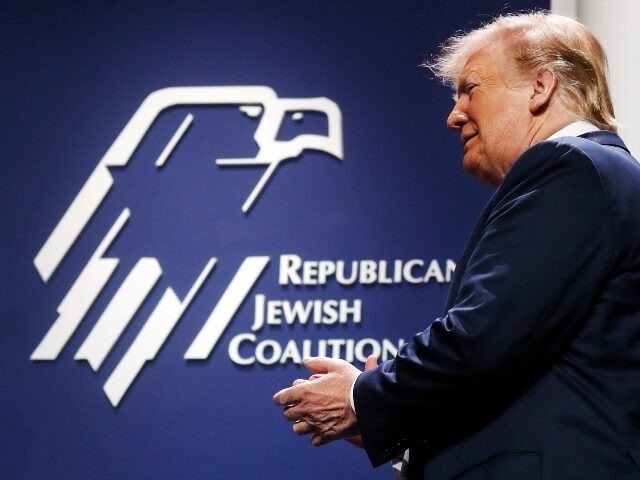LAS VEGAS, Nevada — All eight of the major Republican presidential candidates will address the annual leadership summit of the Republican Jewish Coalition on Saturday morning, as Israel wages war against Hamas in the wake of a major Oct. 7 terror attack.
Here is a summary of each candidate’s record on the issue, and what he or she has to do to win support from the pro-Israel crowd.
In order of appearance, as listed in the (tentative) program for the conference:
Gov. Doug Burgum of North Dakota: Burgum is a relative unknown on the national stage, but issued strong pro-Israel statements in the wake of the Hamas terror attack and blamed President Joe Biden for encouraging hostage-taking by paying billions of dollars to Iran to free Americans.
What he must do: Burgum needs to convince the foreign policy-savvy audience that he understands the issues, and that he stands a chance of competing with better-known, more charismatic candidates.
Former Gov. Chris Christie of New Jersey: Christie understands the Israeli-Palestinian conflict well, though he committed a faux pas at the RJC in 2014 when he called Judea and Samaria (the West Bank) “occupied” when Israel considers the territory “disputed.” He has shown strong support for Ukraine.
What he must do: Christie needs to do more than attack former President Donald Trump, which has been his focus, and convince skeptics that the U.S. can support simultaneous wars in Israel and Ukraine.
Gov. Ron DeSantis in Florida: DeSantis was the most pro-Israel member of Congress, and has led the way among governors. He recently directed state universities to ban Students for Justice in Palestine for supporting Hamas (rhetorically) in the war. He will have many Florida supporters in the audience.
What he must do: DeSantis needs to show his gravitas on the issue, rather than going for easy applause lines or taking jabs at Trump. He needs to project statesmanlike leadership on the topic.
Ambassador Nikki Haley: Haley is a favorite at the RJC, and delivered a stirring address last year. She hits the “sweet spot” of a sterling pro-Israel record at the U.N., and a record of sensitivity to the concerns of Jews and other minorities as governor.
What she must do: Haley has to convince Republicans that she can generate more popular appeal. She needs to talk about the love ordinary Americans have for Israel. She also needs to distinguish between support for Ukraine and support for Israel.
Former Vice President Mike Pence: Pence had a strong pro-Israel record even before his role in the Trump administration. Through his professions of Christian faith, he has come to represent (to the RJC at least) the special constituency of evangelicals who support Israel.
What he must do: Pence has to move beyond the canned pro-Israel speeches that he (and other Republicans) tend to give to the RJC and express his genuine passion on the issue, explaining why it matters to Americans in general.
Vivek Ramaswamny: Ramaswamy has the most controversial record on Israel of all the candidates. He has publicly said that Israel should not invade Gaza in response to the Hamas terror attack, and he has suggested cutting aid to Israel, though he has also said that he supports and admires Israel.
What he must do: It is almost certain that Ramaswamy will face a few boos when he starts. He needs to move past that and focus on what he admires about Israel and not revisit old arguments, as he tends to do.
Senator Tim Scott of South Carolina: Scott has a close rapport with the RJC audience — he had members jumping out of their seats and shouting “Amen!” last year. Recently, he called for the deportation of foreign students who support Hamas, and he has opposed linking Ukraine aid with Israel aid.
What he must do: Scott has to move beyond his personal story of triumph over adversity and convince the audience that he can lead on foreign policy issues despite his relative lack of experience.
Former President Donald Trump: Trump was arguably the most pro-Israel president in U.S. history and kept Israel (and the U.S.) out of war for four years. There is no candidate onstage who can match his record. However, he has taken potshots at the Israeli government, even in recent weeks.
What he must do: Trump has to show he is not going to let his personal grievances against Israeli Prime Minister Benjamin Netanyahu guide his policies, and that he values Israel’s security above his own feelings.
Joel B. Pollak is Senior Editor-at-Large at Breitbart News and the host of Breitbart News Sunday on Sirius XM Patriot on Sunday evenings from 7 p.m. to 10 p.m. ET (4 p.m. to 7 p.m. PT). He is the author of the new biography, Rhoda: ‘Comrade Kadalie, You Are Out of Order’. He is also the author of the recent e-book, Neither Free nor Fair: The 2020 U.S. Presidential Election. He is a winner of the 2018 Robert Novak Journalism Alumni Fellowship. Follow him on Twitter at @joelpollak.

COMMENTS
Please let us know if you're having issues with commenting.